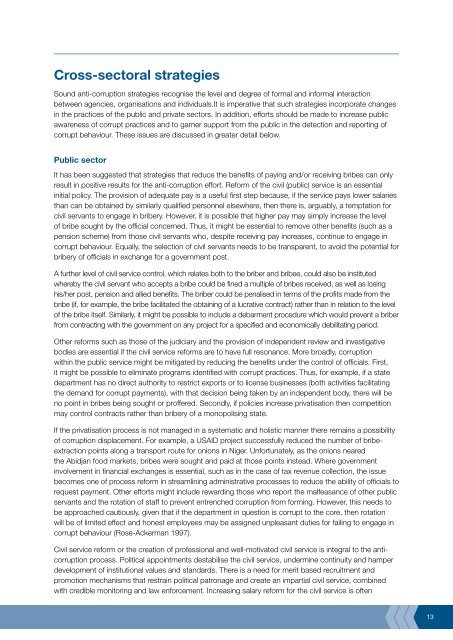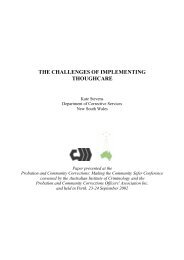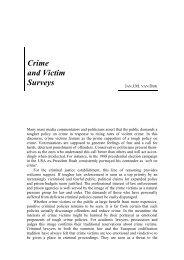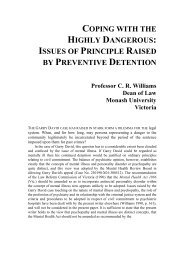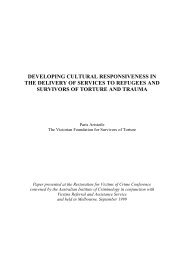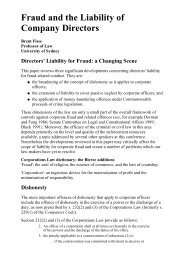Review of anti-corruption strategies Rob McCusker - Australian ...
Review of anti-corruption strategies Rob McCusker - Australian ...
Review of anti-corruption strategies Rob McCusker - Australian ...
Create successful ePaper yourself
Turn your PDF publications into a flip-book with our unique Google optimized e-Paper software.
Cross-sectoral <strong>strategies</strong><br />
Sound <strong>anti</strong>-<strong>corruption</strong> <strong>strategies</strong> recognise the level and degree <strong>of</strong> formal and informal interaction<br />
between agencies, organisations and individuals.It is imperative that such <strong>strategies</strong> incorporate changes<br />
in the practices <strong>of</strong> the public and private sectors. In addition, efforts should be made to increase public<br />
awareness <strong>of</strong> corrupt practices and to garner support from the public in the detection and reporting <strong>of</strong><br />
corrupt behaviour. These issues are discussed in greater detail below.<br />
Public sector<br />
It has been suggested that <strong>strategies</strong> that reduce the benefits <strong>of</strong> paying and/or receiving bribes can only<br />
result in positive results for the <strong>anti</strong>-<strong>corruption</strong> effort. Reform <strong>of</strong> the civil (public) service is an essential<br />
initial policy. The provision <strong>of</strong> adequate pay is a useful first step because, if the service pays lower salaries<br />
than can be obtained by similarly qualified personnel elsewhere, then there is, arguably, a temptation for<br />
civil servants to engage in bribery. However, it is possible that higher pay may simply increase the level<br />
<strong>of</strong> bribe sought by the <strong>of</strong>ficial concerned. Thus, it might be essential to remove other benefits (such as a<br />
pension scheme) from those civil servants who, despite receiving pay increases, continue to engage in<br />
corrupt behaviour. Equally, the selection <strong>of</strong> civil servants needs to be transparent, to avoid the potential for<br />
bribery <strong>of</strong> <strong>of</strong>ficials in exchange for a government post.<br />
A further level <strong>of</strong> civil service control, which relates both to the briber and bribee, could also be instituted<br />
whereby the civil servant who accepts a bribe could be fined a multiple <strong>of</strong> bribes received, as well as losing<br />
his/her post, pension and allied benefits. The briber could be penalised in terms <strong>of</strong> the pr<strong>of</strong>its made from the<br />
bribe (if, for example, the bribe facilitated the obtaining <strong>of</strong> a lucrative contract) rather than in relation to the level<br />
<strong>of</strong> the bribe itself. Similarly, it might be possible to include a debarment procedure which would prevent a briber<br />
from contracting with the government on any project for a specified and economically debilitating period.<br />
Other reforms such as those <strong>of</strong> the judiciary and the provision <strong>of</strong> independent review and investigative<br />
bodies are essential if the civil service reforms are to have full resonance. More broadly, <strong>corruption</strong><br />
within the public service might be mitigated by reducing the benefits under the control <strong>of</strong> <strong>of</strong>ficials. First,<br />
it might be possible to eliminate programs identified with corrupt practices. Thus, for example, if a state<br />
department has no direct authority to restrict exports or to license businesses (both activities facilitating<br />
the demand for corrupt payments), with that decision being taken by an independent body, there will be<br />
no point in bribes being sought or pr<strong>of</strong>fered. Secondly, if policies increase privatisation then competition<br />
may control contracts rather than bribery <strong>of</strong> a monopolising state.<br />
If the privatisation process is not managed in a systematic and holistic manner there remains a possibility<br />
<strong>of</strong> <strong>corruption</strong> displacement. For example, a USAID project successfully reduced the number <strong>of</strong> bribeextraction<br />
points along a transport route for onions in Niger. Unfortunately, as the onions neared<br />
the Abidjan food markets, bribes were sought and paid at those points instead. Where government<br />
involvement in financial exchanges is essential, such as in the case <strong>of</strong> tax revenue collection, the issue<br />
becomes one <strong>of</strong> process reform in streamlining administrative processes to reduce the ability <strong>of</strong> <strong>of</strong>ficials to<br />
request payment. Other efforts might include rewarding those who report the malfeasance <strong>of</strong> other public<br />
servants and the rotation <strong>of</strong> staff to prevent entrenched <strong>corruption</strong> from forming. However, this needs to<br />
be approached cautiously, given that if the department in question is corrupt to the core, then rotation<br />
will be <strong>of</strong> limited effect and honest employees may be assigned unpleasant duties for failing to engage in<br />
corrupt behaviour (Rose-Ackerman 1997).<br />
Civil service reform or the creation <strong>of</strong> pr<strong>of</strong>essional and well-motivated civil service is integral to the <strong>anti</strong><strong>corruption</strong><br />
process. Political appointments destabilise the civil service, undermine continuity and hamper<br />
development <strong>of</strong> institutional values and standards. There is a need for merit based recruitment and<br />
promotion mechanisms that restrain political patronage and create an impartial civil service, combined<br />
with credible monitoring and law enforcement. Increasing salary reform for the civil service is <strong>of</strong>ten


